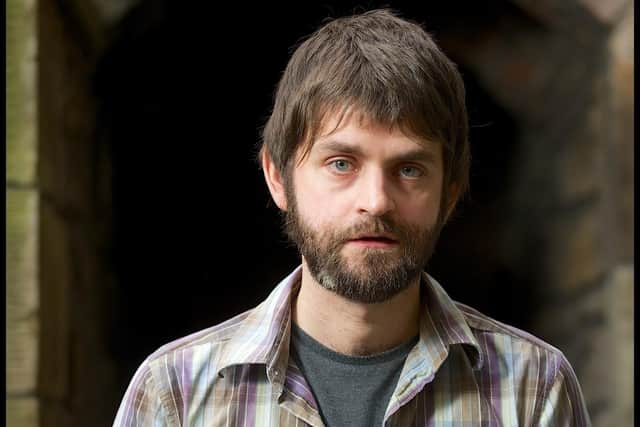Book review: In Ascension, by Martin MacInnes
Ambition is one virtue; accomplishment quite another. I was intrigued by the previous novels from Martin MacInnes – Infinite Ground and Gathering Evidence – and so there was more than an element of delight in reading his new book, in which daring and execution are in perfect alignment. I would sincerely hope to see it on various prize shortlists. In some ways, were you to take a scan of my brain and its obsessions, MacInnes could not have come up with something more designed to reel me in. In Ascension is about, among other things, cosmology, technology, theology, ecology, prebiotics, extra-terrestrial life and loneliness. Its cerebral acrobatics are in no way a sleight of hand to conceal a lack of human heart.
The novel opens in a broadly naturalistic manner. Leigh lives in Rotterdam, and we are given a sketch of her dysfunctional family. Her mother is an emotionally fragile woman who is happiest doing pure mathematics; her father is a frustrated architect who now works on flood controls. He is also emotionally volatile, and Leigh acts as a kind of lightning conductor to protect her younger (and possibly more liked) sister, Helena, from his temper. Her escape is swimming, which leads to a career in microbiology. All these pieces are placed with consideration and all come into play by the end: reticence, trying to hold back tides, substitution, forms of immersion.
Advertisement
Hide AdHer research career takes her at first to a scientific survey of a “black smoker”, a thermal vent, which may be deeper than the Marianas Trench. There are some humans making dives before the autonomous submersible goes down, and it soon becomes evident that the idea of examining the area to ensure that mining might be possible is a cover story. Whatever they encounter down there – and Leigh is intrigued by the idea that thermal vents were the origin of life on earth – has an effect on them all. There are strange lights in the water, and losses of consciousness. The captain tells her, somewhat cryptically, that “It’s a mistake to think of our origins, of all life’s origins, as belonging only to the past. It’s still there.” Then the narrative switches. Leigh has obtained some microbial archaea on the trip and is working on how to turn algae into a foodstuff. She is recruited by the Institute for Co-ordinated Research in Space, and believes that this is because her gene-spliced algae might be a sustainable resource. In addition, humanity now has the ability to travel further in the solar system – not Starship Enterprise style, but far enough – and her experience with the marine depths implies a plan to mine Saturn’s moons. A cover story again. She is going beyond the Earth, but not to Saturn. She and two others are going beyond the Kuiper Belt, where another something inexplicable has been discovered.


Some of the best parts of the book are about boredom. The training, the actual travelling, turn out to be beset by ennui rather than intergalactic threats, and MacInnes does lassitude, tiredness and meaninglessness very well indeed. Although the novel plays with genres – thriller, speculative, mystery – it is far more existentialist. The scenes with the astronauts having to communicate with their earth-based therapists are tingling with excruciation. Even the minutiae of ensuring that the ship is clinically pristine are done with wryness – I never thought I would read a novel in which the procedures surrounding a trip to the smallest room could be done so exquisitely. The scene where Leigh’s boss takes her to a radio telescope and a conversation emerges about its similarity to a cathedral, is aching. We look to the skies and receive no obvious answers.
The novel’s intellectual daring is formidable. It addresses the Fermi Paradox – if the universe is teeming with life, why can’t we find evidence of it – and in some ways winks at CS Lewis’s Out Of The Silent Planet, which explains it as Earth being basically in quarantine because of our uselessness and wickedness. But it does more. Structurally, In Ascension resembles an ouroboros, or a Klein Bottle, eating itself – I might even describe it as Eine Klein’sche-Flasche Nachtmusik, since darkness is such a theme, from the almost Hadean oceanic depths to the Sun diminishing as they head beyond Pluto. The novel’s paradox, in beginning in earnest by going down only to go beyond, comes full circle, and even then does not end. Helena makes a surprise reappearance because the spaceship is supposed to splash down – you’ve guessed it – near Ascension Island. In an age where egomaniacal technocrats are increasingly eyeing up places beyond Earth as real estate or bunkers, there is an affirmative message here about the goodness of staying at home and caring for home. On the first page, Leigh reminisces about pre-War photographs of Rotterdam – “from the remaining buildings to the figures caught walking between them” which “indicated that the world was still growing, still in a state of creation”. It is a brave move to hide a manifesto at the outset. This is fiction which is both stellar and grounded; an exemplar of what the novel alone can still do.
In Ascension, by Martin MacInnes, Atlantic Books, £16.99